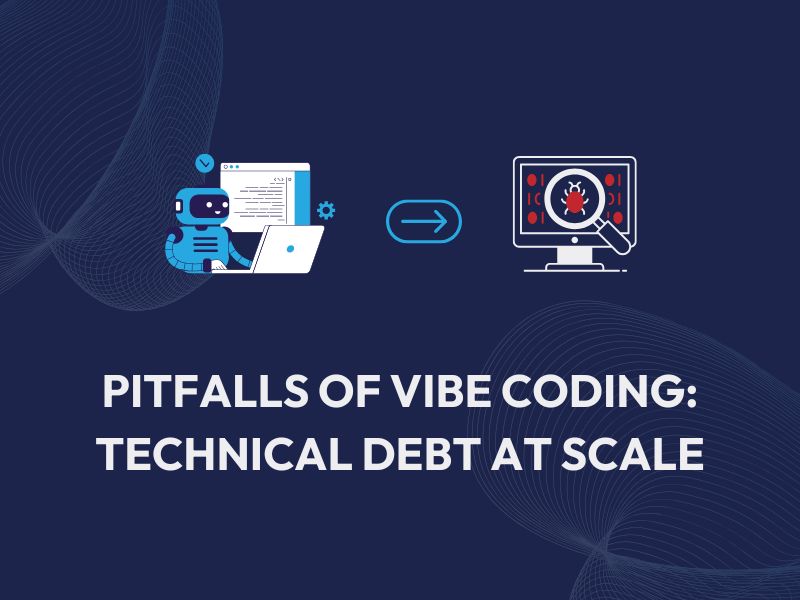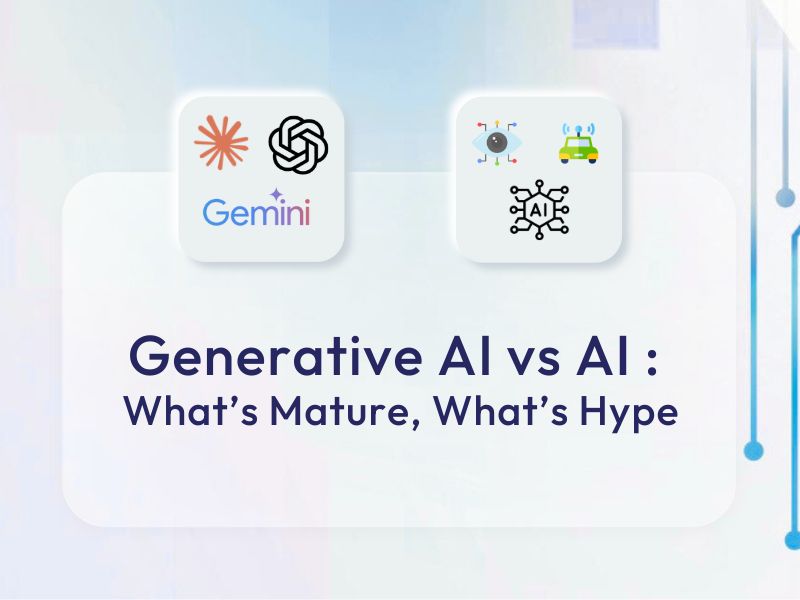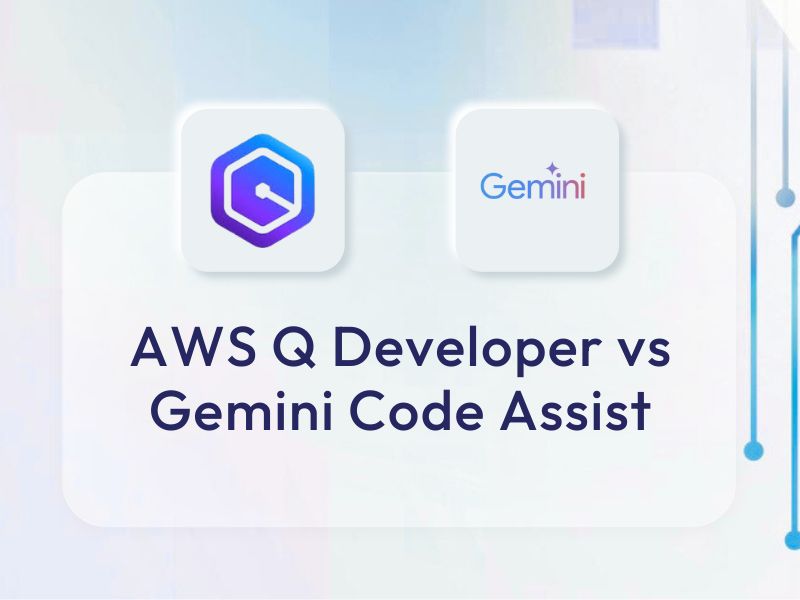Introduction
At Compileinfy, we’re exploring how generative AI tools like GitHub Copilot and Gemini Code Assist can help our developers write better code, faster. While we’re still in the experimentation phase, these AI coding assistants have shown early promise in reducing development friction, especially for repetitive tasks, documentation, and prototyping. This allows our team to focus more on business-critical logic and architecture — ultimately leading to faster client delivery without compromising quality or security.
Why We Started Exploring Generative AI for Software Development
As a technology services company, we work with a range of clients — from startups building MVPs to enterprises scaling complex platforms. In every case, the underlying ask is the same: “Can we build this faster, without cutting corners?”
Speed, clarity, and code quality matter — not just for project success but for business success. We realized that while we have great developers who understand systems deeply, a lot of their time was being spent on tasks that don’t require their full expertise. Things like:
- Writing boilerplate code
- Creating repetitive component structures
- Drafting API contracts
- Writing initial versions of test cases
- Filling in code documentation and comments
These tasks, though an important part of our Software Development Life Cycle, don’t require complex decision-making. They’re essentially mechanical — and that’s exactly where we saw an opportunity to bring in generative AI for coding.
The Problem: Developer Time Wasn't Always Being Used Optimally
Our team’s strength lies in problem-solving — in designing complex APIs, mapping user journeys to technical architecture, optimizing data flows, and ensuring secure, scalable systems.
But a growing chunk of their time was going into mechanical coding work:
- Writing the same logic in different files
- Repeating code comments or docstrings
- Generating mock data or dummy flows for POCs
- Rewriting the same Redux patterns or route guards
This didn’t just reduce speed, it affected energy levels. Developer productivity is not just about time spent typing. It’s about focus and cognitive load.
We needed a way to offload the grunt work, so our team could spend more time doing what they do best.
Our Approach: Testing GitHub Copilot and Gemini Code Assist in Real Projects
We started small. A few developers integrated GitHub Copilot into their VS Code setup. Another batch experimented with Gemini Code Assist.
We didn’t set KPIs or chase quick wins.
The idea was simple
"Let's see where this helps and where it doesn't."
We asked our team to use these AI Coding Assistants for:
- Code completion while writing standard logic
- Creating draft test cases
- Writing initial documentation
- Speeding up refactoring or cleanup
- Exploring quick iterations in POC builds
We were very clear that generative AI would not replace code reviews, security checks, or technical ownership. It’s a suggestion engine — and the final responsibility stays with the developer.
The goal wasn’t to write more code. It was to write less unnecessary code — and shift focus to the work that really matters.
Where Generative AI Is Working: POCs, Repetitive Patterns, and MVP Development
One of the biggest benefits we’ve seen so far is in the early stages of development. When clients want to test out a flow or visualize a concept, GitHub Copilot has helped us move faster. We have seen value in :
Form-heavy UI screens: GitHub Copilot can generate form field scaffolding and basic validation snippets.
REST API integrations: Gemini Code Assist is good at drafting fetch methods with headers, body, and error handling.
Writing unit tests: Especially for CRUD modules, coding assistants provide a strong base for test coverage.
E-commerce cart logic: In one project, we needed to implement shopping cart functionality with multiple payment gateways. These AI coding assistants helped scaffold the basic cart operations, tax calculations, and other stuff while letting our developers focus on the complex business rules around discount stacking and inventory management.
It’s not perfect — we still refactor and review — but we start ahead, not from zero.
Developer Experience: AI-Assisted Development Over Automation
It’s important to clarify something: these generative AI tools don’t think. They don’t understand the business context. They don’t architect systems.
What they can do well is reduce keystrokes, autocomplete familiar patterns, and save cognitive energy.
Our developers don’t feel replaced — they feel supported. They get to stay “in the flow” longer without pausing to search Stack Overflow or check internal wikis for different libraries and modules we use.
Even small things like autogenerating function documentation or suggesting a cleaner loop syntax have an impact. Over the course of a sprint, that adds up to time saved and focus retained.
Security and Quality: Why Guardrails Are Essential in AI-Assisted Development
Pro Tip:
Generative AI is only as good as the people using it.
We’ve seen cases where GitHub Copilot suggested insecure code — such as using outdated encryption methods or skipping input sanitization. These aren’t tool failures — they’re reminders that AI-generated code must be vetted. That’s why we’ve made the following non-negotiables part of our AI usage policy:
- Every AI-suggested block of code is reviewed by a human developer
- Security-sensitive areas are strictly written and reviewed manually
- We educate our team on when not to trust generative AI suggestions
- All AI-generated code goes through the same testing and security validation as manually written code
The reason this works at Compileinfy is because our developers have strong fundamentals. They don’t accept suggestions blindly. They understand context. That’s what keeps things safe, performant, and client-ready.
What AI-Assisted Development Means for Our Clients
A Client is probably not concerned with whether a developer used GitHub Copilot or typed everything by hand. What matters to them is:
- Is the feature built correctly?
- Is the code secure and scalable?
- Can we move fast without breaking things?
That’s the promise we’re trying to keep.
By freeing our developers from mechanical work, we’re giving them more room to solve business problems, architect better systems, and ship faster — especially in early-stage engagements like MVPs or exploratory platforms.
And that’s where generative AI for software development becomes more than just a tool — it becomes a quiet enabler of better outcomes.
Real Client Impact: Faster MVPs Without Compromising Quality
The cumulative effect of using coding assistants shows up in client deliverables:
Faster prototyping cycles: Clients can see working demos sooner, leading to better feedback and iteration.
More time for polish: When boilerplate generation is automated, developers spend more time on user experience details and edge case handling.
Better documentation: AI tools excel at generating initial documentation, which means better handoffs and maintainability.
Reduced technical debt: Starting with cleaner scaffolding often leads to better overall code organization.
Where We Stand Today with GenAI
We’re not here to hype generative AI.
We’re still learning, still experimenting. Some developers use these tools daily; others only in certain workflows. We’re actively refining our internal playbooks, improving code review patterns, and identifying safe zones where AI can accelerate us without risking code quality.
But even at this early stage, the benefits are real — not in big headlines, but in small, cumulative wins:
- Faster scaffolding
- Fewer distractions
- More energy for real engineering
That’s the kind of productivity that scales quietly and sustainably.
If you’re building a product and need a tech partner who understands both deep engineering and modern tools like GitHub Copilot and Gemini Code Assist — let’s talk.





